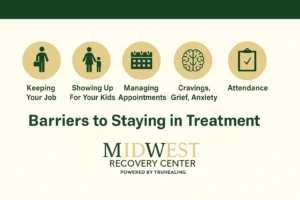You made the courageous decision to start treatment. You showed up. You participated. You opened up about things you hadn’t said out loud in years—or ever. But now, life is happening fast and loud. Again.
You didn’t expect how hard it would be to juggle real life with recovery. Some days it feels like everything is trying to pull you away from the one thing that’s actually helping. The pressure to keep up with sessions, work, family, emotions, and expectations can feel impossible to balance.
You might be tempted to quit. Not because you don’t care about recovery, but because you’re exhausted. If this sounds like you, take a deep breath. You’re not failing. You’re just in the part of healing where things get real.
At Midwest Recovery Center, we work with people every day who are fighting to stay engaged in their Intensive Outpatient Program (IOP) in Toledo, Ohio—while navigating parenting, jobs, transportation issues, financial stress, emotional burnout, and more.
Here’s how you can stay committed, even when it feels like everything around you is pulling you in the opposite direction.
Start by Naming What’s Actually Getting in the Way
The biggest block to staying consistent in IOP isn’t laziness or lack of motivation—it’s unspoken pressure.
You’re probably trying to:
- Keep your job
- Show up for your kids
- Manage appointments
- Stretch every dollar
- Navigate cravings, grief, and anxiety
And still somehow attend three group sessions a week.
Start by giving yourself credit for even trying to hold all of that. Then, take a moment to name exactly what’s standing in your way right now. Is it transportation? A changing work schedule? Childcare? Emotional overwhelm? Shame?
The clearer you are about what’s hard, the better we can help you find a way through it.
Redefine What “Commitment” Looks Like in Recovery
Commitment doesn’t always mean perfection. It doesn’t mean showing up on time, three times a week, with a notebook full of insights and a great attitude.
Some weeks, commitment looks like dragging yourself to one session when you feel like staying in bed.
Other weeks, it’s texting your group leader to say, “I’m struggling, but I’m still here.”
Sometimes, it’s just resisting the urge to ghost.
Recovery isn’t all-or-nothing. It’s an ongoing process of choosing to show up again and again—messy, overwhelmed, unsure—and saying, I still want this.
You don’t have to do it perfectly. You just have to keep doing it honestly.
Ask for Flexibility—It’s Built Into the Program
Many people don’t realize that Intensive Outpatient Programs are designed to be flexible.
At Midwest Recovery, we understand that life doesn’t pause for recovery. That’s why we offer:
- Multiple session times
- Virtual and in-person options (when available)
- Temporary schedule adjustments
- Support navigating work, family, or school conflicts
We’ve had clients from Maumee, Perrysburg, and all over Toledo find ways to adjust their IOP commitment without abandoning care completely.
Your recovery plan isn’t set in stone—it’s a living thing that can grow and shift with you. Ask for what you need. You’ll be surprised how many options are available.
Build Tiny Rituals of Consistency
When life feels unstable, rituals create anchors.
These don’t have to be dramatic. Just simple actions that reinforce your intention to stay the course.
Try:
- Setting an alarm 15 minutes before group with a note that says, “This matters.”
- Drinking the same cup of tea before every session to ground yourself.
- Texting a friend or group member when you’re feeling tempted to skip.
- Choosing one quiet space to attend virtual sessions so it feels familiar.
Tiny rituals give your nervous system a sense of safety and structure. They help you return to center when the outside world feels chaotic.

Let the Group Hold You When You Can’t Hold Yourself
You don’t have to carry this alone.
In IOP, your group isn’t just a requirement—it’s a net. A soft, supportive place where you can fall without judgment.
Share the truth. Tell the group, “I don’t want to be here today, but I came.” Or, “I almost quit this week.” Watch how others nod. Because they’ve been there too.
We’ve seen people in the middle of divorce, job loss, relapses, and grief stay connected through group—even if they had to cry through it. Even if they said nothing and just listened.
Every time you let yourself be seen, even a little, you loosen the grip shame has on your recovery.
Learn to Repair Instead of Run
Missing a session doesn’t mean you’ve failed.
Even disappearing for a week (or more) doesn’t mean you can’t come back. The skill you’re building in IOP isn’t just about staying—it’s about returning.
Life will get in the way sometimes. But you can learn to say:
- “I missed last week. Can I come back?”
- “I felt ashamed, but I don’t want to disappear again.”
- “Can we make a plan that works better for where I’m at now?”
These repair moments are where real recovery happens—not in perfection, but in reconnection.
Stories of Real People Who Almost Gave Up
Ramon, 34 – Oregon, OH:
He was working two jobs and missed three sessions in one week. He thought it meant he was out. Instead, his counselor helped him switch to evening groups. He finished the program—and now mentors new IOP clients.
Jenna, 27 – Toledo, OH:
She relapsed after her third week and didn’t show up for five days. She came back, expecting judgment. Instead, the group welcomed her and said, “We’re glad you came back.” That moment changed everything.
Michelle, 41 – Perrysburg, OH:
A single mom of three, Michelle constantly battled guilt for being “away” during sessions. She stuck with it by scheduling sessions when her kids were asleep—and told them, “Mom’s taking care of herself so I can be a better mom to you.”
FAQs
I’m overwhelmed and barely keeping it together. Should I drop out?
Not necessarily. Let’s talk first. Many clients have been where you are—and stayed. You don’t have to hold it all together to be in treatment. We’ll meet you where you are.
What if I can’t attend all the scheduled sessions?
That’s okay. We can often adjust your schedule to something more manageable. Let us know what’s going on so we can work with you.
I’ve missed multiple sessions already. Can I still continue?
Yes. We believe in repair, not punishment. Talk to your care team about re-engaging. You’re not starting over—you’re continuing your healing.
Can I switch to virtual sessions if I’m struggling with transportation or childcare?
In many cases, yes. We offer virtual options to help make treatment more accessible. Let’s create a plan that works for your life.
I feel like I’m not making progress. Is it worth staying?
Yes. Progress in recovery often feels slow or invisible—until it isn’t. What feels like “not moving” is often your nervous system learning safety. Keep going.
You Don’t Have to Walk Away to Catch Your Breath
When life gets busy, hard, or overwhelming, it’s natural to want to press pause. But in IOP, staying committed doesn’t mean ignoring life—it means learning to navigate it with support.
Call (888) 657-0858 or visit our Intensive Outpatient Program in Toledo, Ohio to talk with someone about how to stay connected to care—even when life doesn’t slow down. We’ll help you adjust, recommit, and keep going.
Because recovery is not about how perfectly you show up. It’s about how often you return.


























